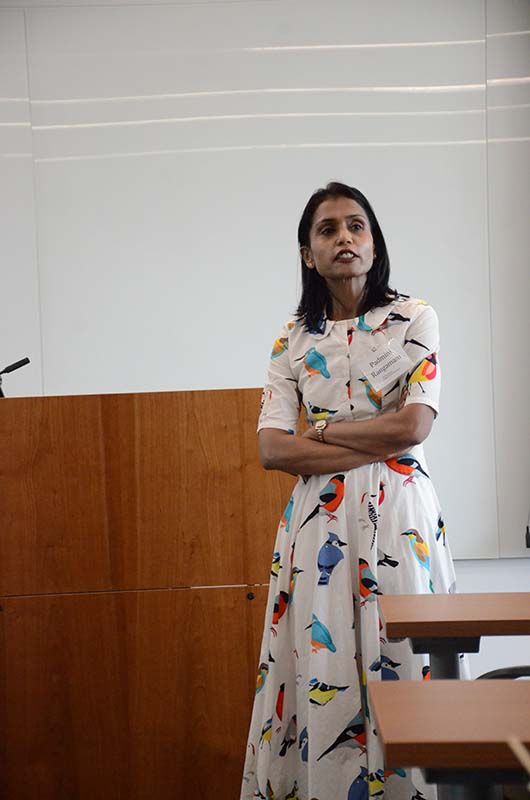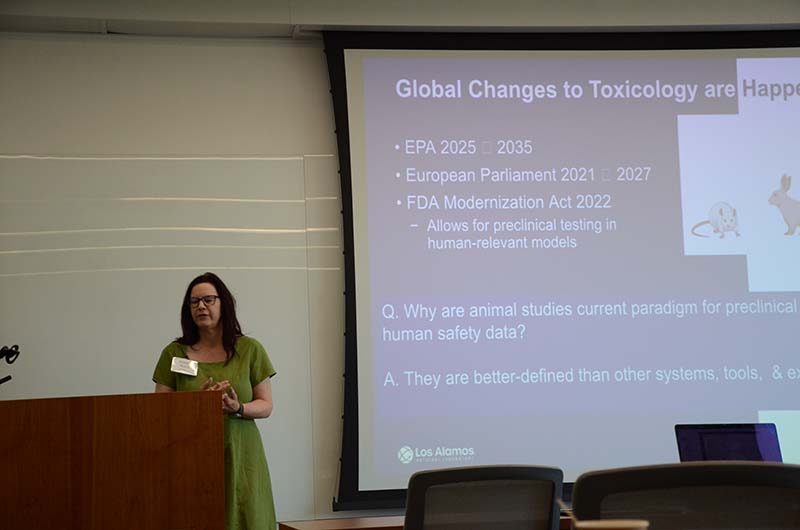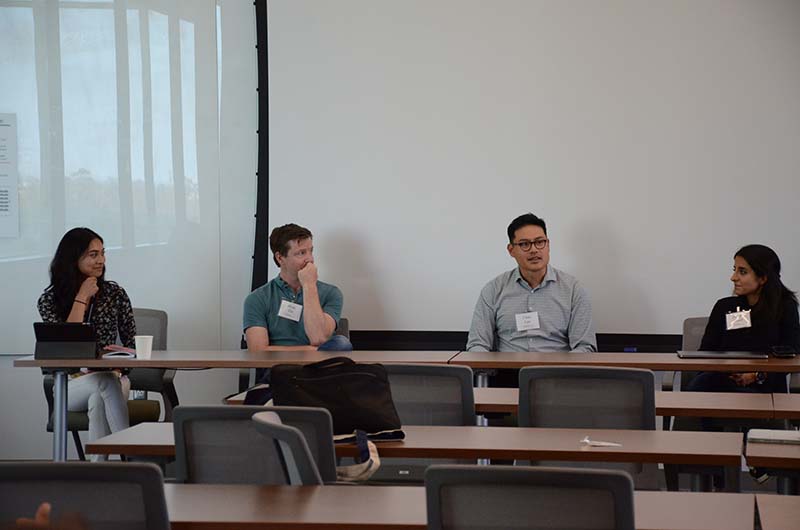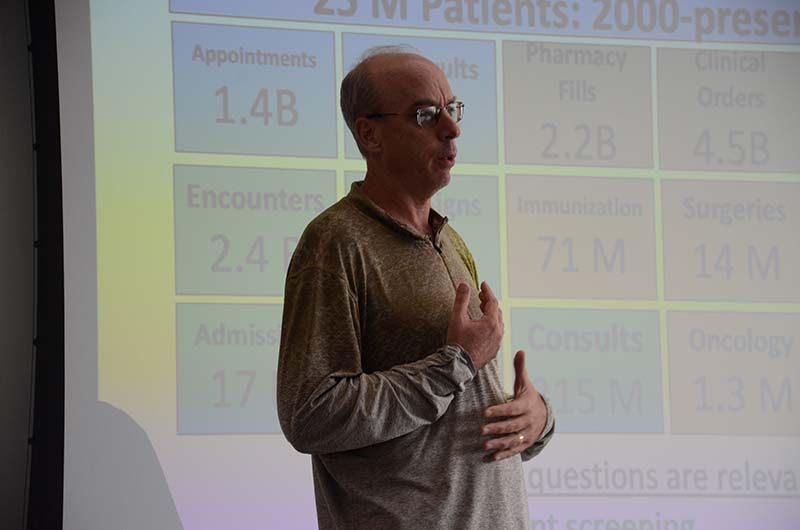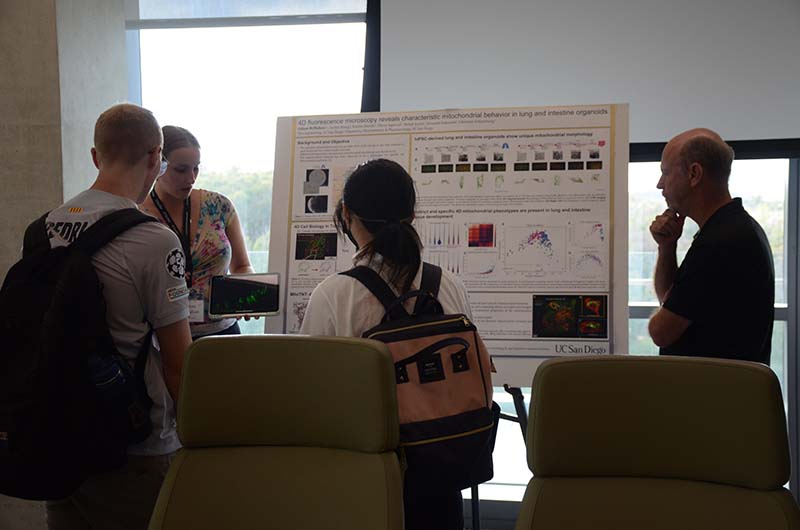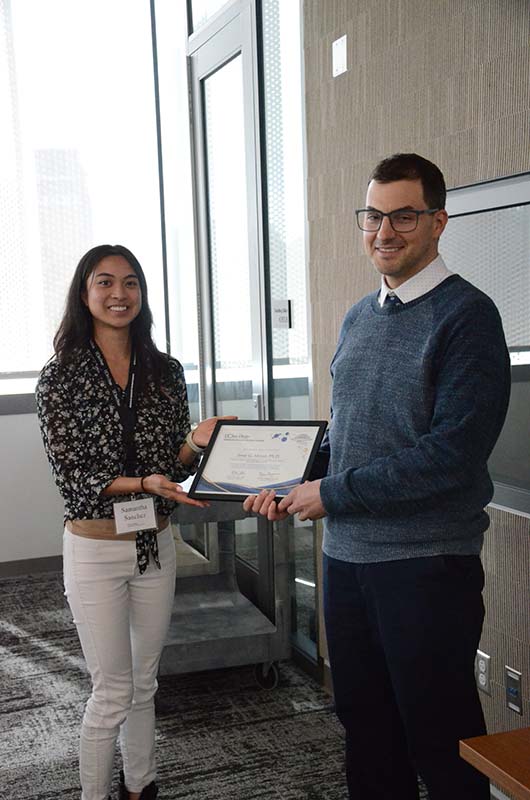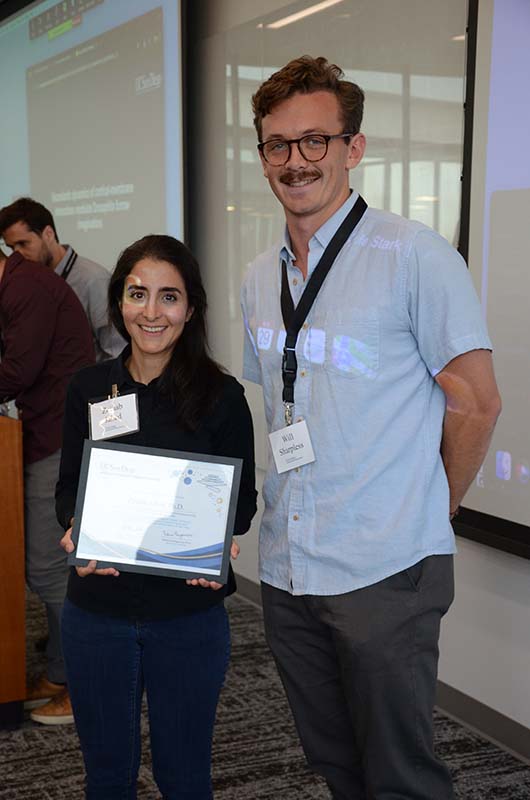
Interfaces Research Symposium for Interdisciplinary Research in Multi-Scale Biology
Multiscale Horizons: Biology and Beyond
This event offers trainees the opportunity to present their work to faculty and peers across the disciplines of biological, engineering, physical, and health sciences. In addition, it provides attendees the chance to learn about Interfaces and to identify and network with researchers with common interests within the UC San Diego community. See videos of all the presentations on the Interfaces YouTube channel. Should you have any questions, please contact the Interfaces Program at interfaces@ucsd.edu.
Date: Thursday, August 29, 2024
Time: 8:15 AM to 4:45 PM
Location: Franklin Antonio Hall, Room 4201
3180 Voigt Drive, La Jolla, 92093, UCSD campus map
This event will include Keynote Speakers, Career Development and Faculty Research Talks, and a Trainee Poster Session.
PROGRAM SCHEDULE
8:15 AM - Breakfast
9:15 AM - Welcome and Opening Remarks: - Andrew McCulloch, Ph.D. - Professor, UC San Diego Shu Chien-Gene Lay Department of Bioengineering and School of Medicine
Padmini Rangamani, Ph.D., Professor, UC San Diego Department of Pharmacology
9:30 AM - Keynote Presentation: Zeinab Jahed, Ph.D., Assistant Professor, UC San Diego Aiiso Yufeng Li Family Department of Chemical and Nano Engineering
"Overcoming cellular barriers for sensing and delivery"
10:15 AM - Trainee Talk: Kyle Stark, UC San Diego Ph.D. Student and Interfaces Trainee, Mechanical & Aerospace Engineering
"Viscoelastic dynamics of cortical-membrane interactions modulate Drosophila furrow invaginations"
11:00 AM - Keynote Presentation: Jennifer Harris, Ph.D., DABT, Los Alamos National Laboratory
"Facilitating unique research and discoveries by partnering scientists across vastly different fields"
NOON - LUNCH
1:00 PM - Academic Panel Discussion
Zeinab Jahed, Ph.D., Assistant Professor, UC San Diego Department of Chemical and NanoEngineering
Christopher Lee, Ph.D., Assistant Professor, UC San Diego Department of Molecular Biology
Brian Zid, Ph.D., Associate Professor, UC San Diego Department of Chemistry & Biochemistry
2:00 PM - Keynote Presentation: Jesse G. Meyer, Ph.D., Assistant Professor, Cedars-Sinai Medical Center and Interfaces Alumnus
"Fast Proteomics and Multi-Omics by Direct Infusion"
2:45 PM - Industry Panel Discussion
Nick Edwards, Ph.D., CEO and Founder of Potato
Carlos Lopez, Ph.D., Sr. Manager, Engineering at Illumina, Inc.
Meagan Rubel, Ph.D., MPH, Associate Director, R&D Data Science at Johnson & Johnson Innovative Medicine.
3:45 PM - Keynote Presentation: Ben McMahon, Ph.D., Los Alamos National Laboratory
"Relating high dimensional predictions of suicide risk in 4.2 million US Veterans to multiscale biology"
4:45 PM - Poster Session and Networking Mixer
SPEAKER BIOS
Andrew McCulloch, Ph.D. is the Shu Chien Chancellor’s Endowed Chair in Engineering and Medicine at the University of California San Diego and Director of the Institute of Engineering in Medicine. He leads the Wu-Tsai Human Performance Alliance at UC San Diego, directs the UCSD Interfaces Graduate Training Program and the Interdisciplinary Ph.D. Specialization in Multi-Scale Biology as well as the UCSD NHLBI Graduate Training Program. Dr. McCulloch served as both Vice Chair and Chair of the Bioengineering Department and is a member of the Qualcomm Institute and a Senior Fellow of the San Diego Supercomputer Center.
Dr. McCulloch received his Ph.D. in Engineering Science from the University of Auckland. He has served on the Board of Directors of the Bio-Medical Engineering Society and is currently Associate Editor of PLoS Computational Biology. He also serves on the Executive Council of the International Union of Physiological Sciences.
Dr. McCulloch has published over 300 peer-reviewed research articles. His lab uses multi-scale engineering approaches to help understand, diagnose and treat heart diseases and to understand the biological principles underlying human athletic performance. They use experimental and computational models to investigate the relationships between the cellular and molecular structure of cardiac and skeletal muscle and the electrical and mechanical function of the musculoskeletal system in response to training and the whole heart during ventricular remodeling, heart failure, and arrhythmia. The lab is also developing new methods to use computational models and machine learning for clinical use and has licensed technologies that are now approved by the FDA for clinical use.
Padmini Rangamani, Ph.D. is a Professor at the UC San Diego Department of Pharmacology in the School of Medicine and in the Department of Mechanical and Aerospace Engineering. Additionally, she serves as UCSD Affiliate Faculty in Nanoengineering, Bioengineering, the Center for Circadian Biology, and the Materials Science and Engineering Program. She was a Chancellor’s postdoctoral fellow in the Department of Molecular and Cell Biology and in the Department of Mechanical Engineering at UC Berkeley in 2013-14. She earned her Ph.D. in biological sciences in 2010 at the Icahn School of Medicine at Mount Sinai Medical Center in New York.
Dr. Rangamani's research is focused on understanding the design principles of biological systems. Her long-term research goal is to understand the control of cell shape by analyzing biological membranes and their interaction with proteins and the cytoskeleton using principles from transport phenomena. This is a unifying framework that brings together mechanics of the membrane, membrane-bound proteins, and their coupled interactions. Her work uses a combination of novel mechanical theories and computational approaches to simulate many aspects of cellular membranes, in collaboration with experimentalists. Areas of current focus include:
- Transport phenomena in biological membranes: How do lipid flow, lipid diffusion and protein diffusion interact with bulk cytoplasmic fluid and proteins in solution to regulate cell shape?
- Influence of cell shape on biochemical activation of signaling networks: How does a given cell shape affect the activation of signaling networks and transcription factor activation?
- Morphological and topological changes to lipid membranes mediated by proteins and cytoskeletal forces: How do membrane proteins and cytoskeletal elements interact with the plasma membrane to generate morphological changes (e.g. endocytosis) or topological changes (e.g. vesicle fusion)?
Zeinab Jahed, Ph.D. is an Assistant Professor in the Department of Chemical and Nanoengineering at the Jacobs School of Engineering at UC San Diego. She completed her Postdoctoral Research Fellowship in the Department of Chemistry at Stanford University in 2020, following her Ph.D. in Applied Science and Technology from the University of California, Berkeley, where she studied within the Departments of Mechanical Engineering and Bioengineering, graduating in 2018. Before her academic journey in California, Dr. Jahed earned her Bachelor's degree in Mechatronics Engineering from the University of Waterloo in Canada. Her research is highly interdisciplinary, bridging various fields within engineering and biological sciences. The current research in Dr. Jahed's lab focuses on developing materials and devices that can integrate with cells at multiple scales. These devices and sensors have significant applications in cellular sensing and delivery systems.
Kyle Stark is a UC San Diego Ph.D. student in the Department of Mechanical and Aerospace Engineering and an Interfaces trainee. He received a B.Sc. in mechanical and aerospace engineering from Rutgers University. Kyle then worked as a design and manufacturing engineer in Dallas, TX, before moving to Los Angeles, CA, to work as a build reliability engineer for SpaceX. There he worked on the exterior structures of the Dragon capsule. In 2022, he joined Dr. Padmini Rangamani’s lab as a Ph.D. student, where he works on biophysical models of cellular morphogenesis.
Jennifer Harris, Ph.D., DABT is Group Leader of the Physical Chemistry and Applied Spectroscopy Group at Los Alamos National Laboratory. She was trained as a respiratory toxicologist and over time her research became bioengineering-focused due to the lack of good non-animal models. Her research career centered on the development of non-animal models for: 1) Understanding low dose radiation exposure, 2) Elucidating the interaction of pathogens with host, and 3) Assessment of the toxicology and pharmacodynamics of medical countermeasures to chemical exposures. Dr. Harris' work has been awarded two R&D 100 awards. She currently leads a diverse group of experimental scientists spanning five different disciplines ranging from remote sensing to vaccine development.
Jesse G. Meyer, Ph.D. is an Assistant Professor in the Department of Computational Biomedicine at Cedars Sinai Medical Center in Los Angeles. He completed his undergraduate degree at the University of Minnesota before completing his M.S. and Ph.D. at UCSD in the Chemistry department while supported by the Interfaces Graduate Training Program. Dr. Meyer trained as an NIH T32 postdoctoral fellow at the Buck Institute for Research on Aging and as an NIH T15 postdoctoral fellow at UW-Madison.
Dr. Meyer’s research laboratory is a hybrid wet lab and dry lab that focuses on developing and applying omics and data science to discover drugs for diseases of aging like neurodegeneration and sarcopenia. His team consists of engineers, bioinformaticians, chemists, cell biologists, and pharmacists. They primarily focus on proteomics and machine learning but also iPSC-derived neurons, statistical tools, metabolomics, and electronic health records. In 2021, he received the NIGMS R35 MIRA and was named a 40 under 40 rising star in proteomics and metabolomics by the Journal of Proteome Research. In 2023 he received the Research Award from the American Society for Mass Spectrometry.
Benjamin McMahon, Ph.D. As Group Leader of the Theoretical Biology and Biophysics Group in the Theoretical Division of Los Alamos National Laboratory, Dr. McMahon is responsible for the management of approximately 50 scientists working in both basic and applied science in the area of mathematical and computational biology supporting national security. He has worked with this group to apply evolutionary analysis, systems-level models, and molecular modeling to basic science, infectious disease, and biotechnology problems of interest, including epidemiological modeling and decision support, computational aspects of vaccine development, and medical outcomes research for cancer, cardiovascular disease, and suicide prevention. His own research has spanned this breadth, from studies of the physics of protein dynamics to epidemiological decision support for national planning. In the past few years, this has included serving as the National lead for DOE/VA collaboration to bring scalable analytics to the analysis of VA electronic medical records. Dr. McMahon was the PI on development of the bioinformatics package, Sequedex, which provides a metagenomic read-based annotation of both phylogeny and function, across the entire tree of life.
ACADEMIC PANELIST BIOS
Zeinab Jahed, Ph.D. is an Assistant Professor in the Department of Chemical and Nanoengineering at the Jacobs School of Engineering at UC San Diego. She completed her Postdoctoral Research Fellowship in the Department of Chemistry at Stanford University in 2020, following her Ph.D. in Applied Science and Technology from the University of California, Berkeley, where she studied within the Departments of Mechanical Engineering and Bioengineering, graduating in 2018. Before her academic journey in California, Dr. Jahed earned her Bachelor's degree in Mechatronics Engineering from the University of Waterloo in Canada. Her research is highly interdisciplinary, bridging various fields within engineering and biological sciences. The current research in Dr. Jahed's lab focuses on developing materials and devices that can integrate with cells at multiple scales. These devices and sensors have significant applications in cellular sensing and delivery systems.
Chris Lee, Ph.D. received a B.Sc. in chemistry, a B.A. in computer science, and a M.Sc. in biochemistry from the University of Virginia. He received his Ph.D. in 2019 from UC San Diego, where he worked with Drs. Rommie Amaro and J. Andrew McCammon on molecular simulations. Dr. Lee continued his research at UCSD working with Dr. Padmini Rangamani working on models for cellular membrane mechanics and cell signaling. He joined the Molecular Biology faculty at UCSD in 2024. The goal of the Lee Lab is to explore how organization in and around cellular membranes leads to organellar and subcellular ultrastructure using multiscale biophysical models.
Brian Zid, Ph.D. is an Associate Professor in the Department of Chemistry and Biochemistry at UC SanDiego. He grew up in a small town in southern Missouri, before starting his academic journey at Truman State University where he earned his B.S. in Chemistry. For his Ph.D. at the California Institute of Technology, Brian studied the genetic mechanisms of aging in Drosophila, contributing to the discovery that the TOR pathway plays a key role in regulating lifespan. His interest in calorie restriction and aging led him to pursue postdoctoral research in Erin O'Shea's systems biology lab at Harvard University, where he investigated how cells respond to changes in nutrients.
In 2015, Dr. Zid joined UC San Diego, where he established his own laboratory. His lab’s current research focuses on understanding how mRNA localization to mitochondria impacts gene expression and mitochondrial function. The Zid lab employs an interdisciplinary approach to tackle this complex issue, combining techniques from biochemistry, genomics, microscopy, and computational modeling. Through this multifaceted strategy, his team aims to uncover new insights into the fundamental mechanisms of gene expression control, potentially contributing to our broader understanding of cellular biology and aging processes.
INDUSTRY PANELIST BIOS
Nick Edwards, Ph.D. is a neuroscientist-turned-entrepreneur. After his postdoc at UC San Diego, he worked in business strategy at Boston Consulting Group and at Illumina. Dr. Edwards is a co-founder and CEO at Potato, where he is building an AI research assistant that helps users build wetlab protocols and automate computational workflows. His goal is to make science faster and more reliable. Nick also hosts the Once a Scientist podcast, where he interviews scientists across various fields to highlight the diverse career paths available to them.“
Carlos Lopez, Ph.D. is a Sr. Manager of Engineering focused on new product introduction into manufacturing for Global Operations at Illumina, Inc. He received his doctorate in Biomedical Engineering from Boston University in 2007 and a B.S. degree in Bioengineering: Biotechnology from UC San Diego. Dr. Lopez manages a team of engineers and scientists that work on measurement process development, characterization, and implementation in a high-volume production environment, for complex consumable devices used in DNA sequencing technology platforms.
Meagan Rubel, Ph.D., MPH is an Associate Director in R&D Data Science at Johnson and Johnson Innovative Medicine. She received her doctorate and masters in public health from the University of Pennsylvania, where she characterized enteric pathogens and gut microbial composition within sub-Saharan Africans with traditional lifestyles (hunting and gathering, small-scale agriculture, pastoralism). Her postdoctoral work at UC San Diego helped develop convolutional neural network-based (CNN) localization of COVID-19 associated pneumonia and prediction of patient outcomes using radiologist-supervised transfer learning. At JJIM, Dr. Rubel has used real-world data analytics and AI/ML methods to model long-term flu and COVID-19 dynamics, and develops computational models to improve clinical trial feasibility and execution.
INTERFACES TRAINEES

